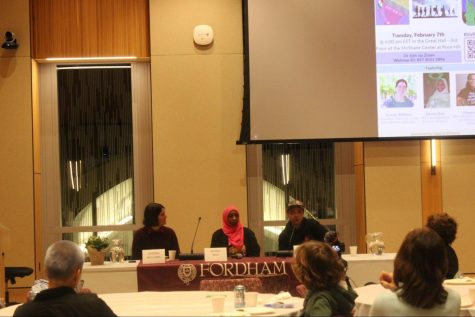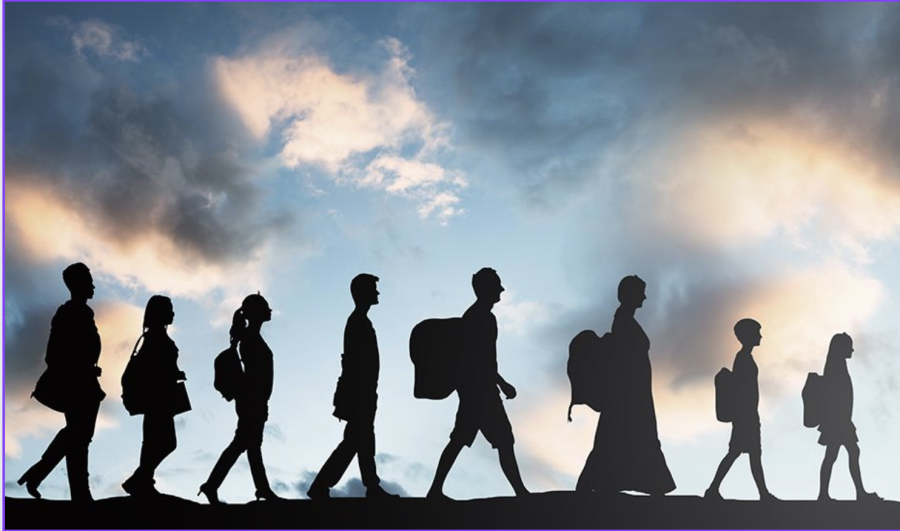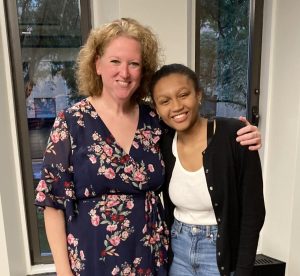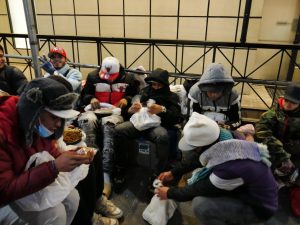Campus Ministry Hosts Panel on Issues Migrants and Asylum Seekers Face
The Common Grounds Conversation featured several community leaders who discussed their work with migration and social justice
February 24, 2023
Campus Ministry’s Pedro Arrupe Volunteers hosted a panel on Feb. 7 titled “Common Grounds Conversations: Current Realities of Migrants and Asylum Seekers.” The discussion, which took place in the Joseph M. McShane, S.J. Campus Center’s Great Hall at the Rose Hill Campus, aimed to raise awareness of the ongoing problems that migrants and asylum seekers face while crossing the U.S.-Mexico border and in New York City.
The panel featured Joanna Williams, executive director of the Kino Border Initiative; Adama Bah, a Guinean-born immigration reform activist; and Power Malu, founder of Artists Athletes Activists.
They were invited to share their perspectives on migration in relation to both U.S. President Joe Biden’s expansion of a series of former President Donald Trump’s border policies and the increasing volume of migrants arriving in New York City due to Texas Gov. Greg Abbott’s migrant busing program.
“The U.S. government together with the Mexican government has had their approach to the border really since the 1990s of ‘if we can only make people suffer more, then they won’t come to the U.S.” Joanna Williams, executive director of the Kino Border Initiative
Williams spoke about her experiences at the Kino Border Initiative, a Catholic organization that aims to “promote humane, just and workable migration,” according to the organization’s mission statement. Located in Nogales, Sonora, Mexico, the Kino Border Initiative works with Fordham’s Center for Community Engaged Learning, which oversees Global Outreach, a cultural immersion program that sends Fordham students on service trips.
She explained how the intentions of the U.S. border policies clash with the human welfare of migrants who are searching for a better life.
“The U.S. government together with the Mexican government has had their approach to the border really since the 1990s of ‘if we can only make people suffer more, then they won’t come to the U.S,’” Williams said about what she called “prevention through deterrence.”
She recounted an experience she had with Louis, a Guatemalan migrant and father of a 12-year-old girl who “almost died along the journey and spent several days out in the desert.” Williams added that Louis had no choice but to turn himself in to border control, highlighting how he is among hundreds of thousands of migrants who are already facing severe conditions at home and must now go through harsh circumstances.
Under United States law, anybody who arrives at the border must be given the chance to undergo a basic screening for asylum and have their application considered if they have a credible fear of returning to their home country. In 2016, however, the Trump administration introduced the process of “metering,” which allows U.S. Customs and Border Protection officers to limit the number of individuals entering at the ports of entry every day.
According to Williams, the U.S. government used the outbreak of the pandemic as “a pretext to close off access to asylum.” Under Title 42, which permits border officials to refuse entry to migrants in order to prevent the spread of communicable diseases such as COVID-19, over 2.5 million migrants were expelled back to Mexico.
Malu then emphasized that love and empathy is necessary in the New York City community, especially in the wake of the ongoing migrant crisis. He connected his organization’s advocacy for immigration to his background as an Puerto Rican immigrant and, in his own words, being a “second-class citizen” growing up in the city.
“When the people come to New York City, this is the first place that they actually are being listened to aside from grassroots organizations that are on the ground on the other side (of the border). New York City is the place they had been told they were going to get help,” Malu said.
“We are going to advocate for them. We are going to be that voice, and we are going to be the ones that help them.” Power Malu, founder of Artists Athletes Activists
He also reminded the audience of the difficult obstacles migrants will continue to face today, such as “a lot of rejection, a lot of mistreatment, a lot of people who are gonna say harsh things like ‘you guys are coming here to take our resources’ or ‘you guys are coming here to take our jobs,’” even in a sanctuary city such as New York.
Malu added that grassroots organizations are the ones who had to step in place of New York City Mayor Eric Adams’ administration because the latter’s shelters and basic necessities are overwhelmed by the number of refugees coming to the city.
“We have to break the news to them. We speak to them, and we share the real deal of what they can expect,” he said. “We are going to advocate for them. We are going to be that voice, and we are going to be the ones that help them.”
Bah partners with Artist Athletes Activists and Team TLC NYC, a grassroots organization that provides basic necessities to busloads of migrants coming to the city. She emigrated to the U.S. at the age of two and was 16 when she and her family were detained by the FBI and her father was deported back to Guinea. Since then, Bah has spent her entire life advocating for immigration reform. She currently volunteers at the Port Authority Bus Terminal where she has been aiding recently arrived migrants and asylum seekers to navigate the city.

She shared how she advocated not only for immigration reform but for a specific cause she believed was underrepresented in the public narrative: a lack of representation for African-born Black immigrant populations, such as those from Senegal and Haiti.
“Every time I get the opportunity to talk about or be part of the panel, I make it my job to be there because there is a lack of representation of Black immigrants and the Black migrant story,” Bah said. “We get the Hispanics, Asians and everyone, but where are the Black migrants? Where are their stories? How can I bring light to their stories?”
Bah also highlighted the lack of language access and cultural needs as one of the most challenging barriers in an immigration system that primarily focuses on accommodating Spanish-speaking migrants. In addition, she mentioned that African and Middle Eastern languages, as well as clothing for Muslims such as head scarfs, are needed to help individuals from nations such as Afghanistan, Iran and Turkey.
Bah, Williams and Malu underscored that they have more work to do and remain determined to provide migrants the welcome and support they so generously deserve.
Bah also expressed her dismay at Adams’ lack of response to an issue she believed should have been foreseen. She recounted the first time she had learned of the busing program via word of mouth, which spurred her to warn the administration in July, a month prior to the first bus arrival. But to her disappointment, her warnings were left unheeded.
“We had the opportunity to be ready for it. We had the chance to open up many hotels to help the migrants who are recovering,” Bah said. “We had the chance to do legal services. We had the chance to enroll these children in the DOE (Department of Education). But we ignored the crisis just like we ignored many other crises.”
Bah, Williams and Malu underscored that they have more work to do and remain determined to provide migrants the welcome and support they so generously deserve.
The panel was livestreamed and is available online for those who could not attend the event.













